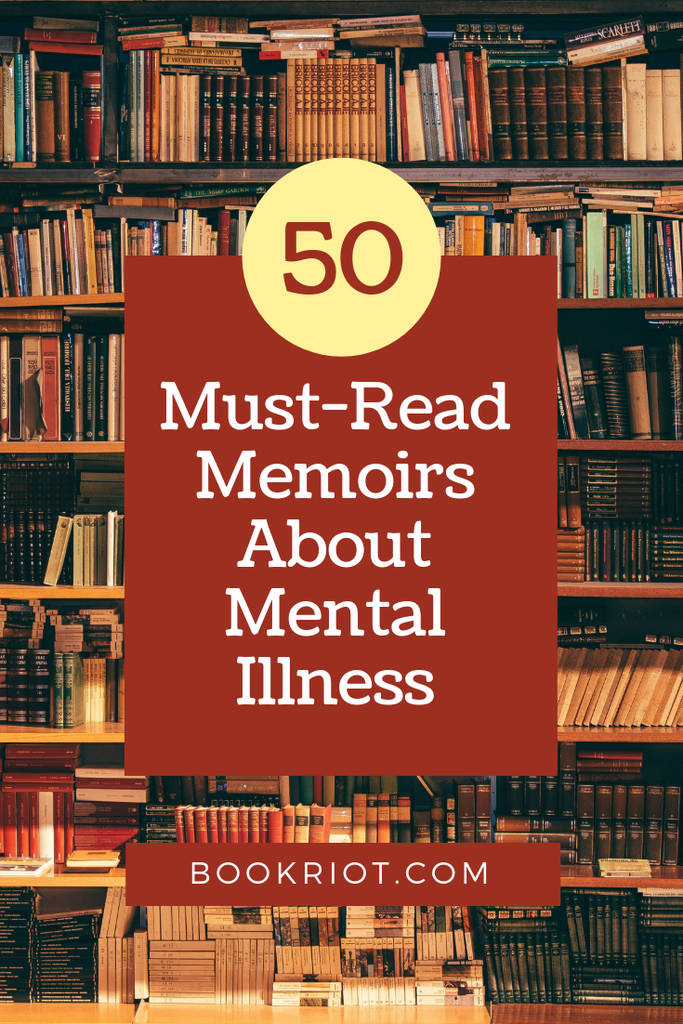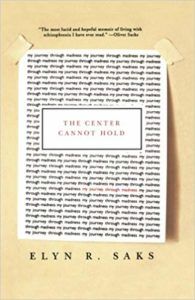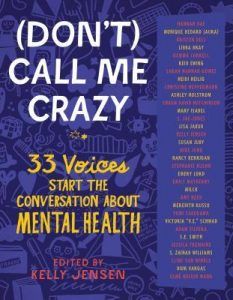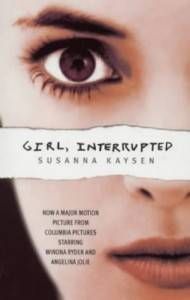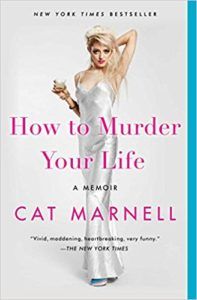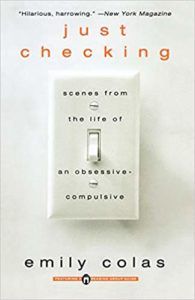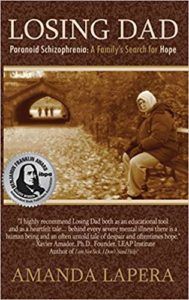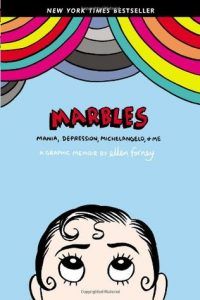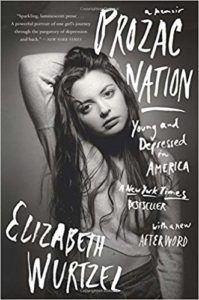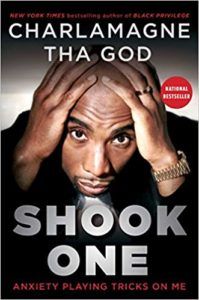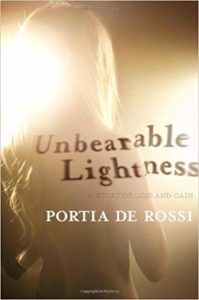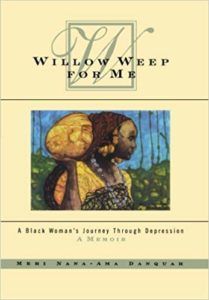Descriptions graciously supplied from publisher descriptions and condensed when necessary.
Agorafabulous! by Sara Benincasa
The Body Papers by Grace Talusan
Brain on Fire: My Month of Madness by Susannah Cahalan
“…Brain on Fire is the powerful account of one woman’s struggle to recapture her identity. When twenty-four-year-old Susannah Cahalan woke up alone in a hospital room, strapped to her bed and unable to move or speak, she had no memory of how she’d gotten there. Days earlier, she had been on the threshold of a new, adult life: at the beginning of her first serious relationship and a promising career at a major New York newspaper. Now she was labeled violent, psychotic, a flight risk. What happened?
The Buddha and the Borderline by Kiera Van Gelder
“Kiera Van Gelder’s first suicide attempt at the age of twelve marked the onset of her struggles with drug addiction, depression, post-traumatic stress, self-harm, and chaotic romantic relationships-all of which eventually led to doctors’ belated diagnosis of borderline personality disorder twenty years later.
The Center Cannot Hold: My Journey Through Madness by Elyn R. Saks
“Elyn R. Saks is an esteemed professor, lawyer, and psychiatrist and is the Orrin B. Evans Professor of Law, Psychology, Psychiatry, and the Behavioral Sciences at the University of Southern California Law School, yet she has suffered from schizophrenia for most of her life, and still has ongoing major episodes of the illness.
The Collected Schizophrenias by Esmé Weijun Wang
The Color of Hope: People of Color Mental Health Narratives edited by Vanessa Hazzard
Darkness Visible: A Memoir of Madness by William Styron
“A work of great personal courage and a literary tour de force, this bestseller is Styron’s true account of his descent into a crippling and almost suicidal depression. Styron is perhaps the first writer to convey the full terror of depression’s psychic landscape, as well as the illuminating path to recovery.”
(Don’t) Call Me Crazy: 33 Voices Start the Conversation about Mental Health edited by (Book Riot Editor) Kelly Jensen
“To understand mental health, we need to talk openly about it. Because there’s no single definition of crazy, there’s no single experience that embodies it, and the word itself means different things—wild? extreme? disturbed? passionate?—to different people.
Down Came the Rain: My Journey Through Postpartum Depression by Brooke Shields
“In her bestselling memoir, Brooke Shields shares with the world her deeply personal experience with postpartum depression
Fast Girl: A Life Spent Running from Madness by Suzy Favor Hamilton
This Fragile Life: A Mother’s Story of a Bipolar Son by Charlotte Pierce-Baker
“Charlotte Pierce-Baker did everything right when raising her son, providing not only emotional support but the best education possible. At age twenty-five, he was pursuing a postgraduate degree and seemingly in control of his life. She never imagined her high-achieving son would wind up handcuffed, dirty, and in jail.
Girl, Interrupted by Susanna Kaysen
“In 1967, after a session with a psychiatrist she’d never seen before, eighteen-year-old Susanna Kaysen was put in a taxi and sent to McLean Hospital. She spent most of the next two years in the ward for teenage girls in a psychiatric hospital as renowned for its famous clientele—Sylvia Plath, Robert Lowell, James Taylor, and Ray Charles—as for its progressive methods of treating those who could afford its sanctuary.
Haldol and Hyacinths: A Bipolar Life by Melody Moezzi
“With candor and humor, a manic-depressive Iranian-American Muslim woman chronicles her experiences with both clinical and cultural bipolarity. Born to Persian parents at the height of the Islamic Revolution and raised amid a vibrant, loving, and gossipy Iranian diaspora in the American heartland, Melody Moezzi was bound for a bipolar life. At 18, she began battling a severe physical illness, and her community stepped up, filling her hospital rooms with roses, lilies and hyacinths. But when she attempted suicide and was diagnosed with bipolar disorder, there were no flowers. Despite several stays in psychiatric hospitals, bombarded with tranquilizers, mood-stabilizers, and anti-psychotics, she was encouraged to keep her illness a secret—by both her family and an increasingly callous and indifferent medical establishment. Refusing to be ashamed or silenced, Moezzi became an outspoken advocate, determined to fight the stigma surrounding mental illness and reclaim her life along the way.
Heart Berries: A Memoir by Terese Marie Mailhot
“Heart Berries is a powerful, poetic memoir of a woman’s coming of age on the Seabird Island Band in the Pacific Northwest. Having survived a profoundly dysfunctional upbringing only to find herself hospitalized and facing a dual diagnosis of post traumatic stress disorder and bipolar II disorder; Terese Marie Mailhot is given a notebook and begins to write her way out of trauma. The triumphant result is Heart Berries, a memorial for Mailhot’s mother, a social worker and activist who had a thing for prisoners; a story of reconciliation with her father―an abusive drunk and a brilliant artist―who was murdered under mysterious circumstances; and an elegy on how difficult it is to love someone while dragging the long shadows of shame.
Heavy: An American Memoir by Kiese Laymon
How to Murder Your Life by Cat Marnell
“From the New York Times bestselling author and former beauty editor Cat Marnell, a “vivid, maddening, heartbreaking, very funny, chaotic” (The New York Times) memoir of prescription drug addiction and self-sabotage, set in the glamorous world of fashion magazines and downtown nightclubs. At twenty-six, Cat Marnell was an associate beauty editor at Lucky, one of the top fashion magazines in America—and that’s all most people knew about her. But she hid a secret life. She was a prescription drug addict. She was also a “doctor shopper” who manipulated Upper East Side psychiatrists for pills, pills, and more pills; a lonely bulimic who spent hundreds of dollars a week on binge foods; a promiscuous party girl who danced barefoot on banquets; a weepy and hallucination-prone insomniac who would take anything—anything—to sleep.
Hunger: A Memoir of (My) Body by Roxane Gay
“New York Times bestselling author Roxane Gay has written with intimacy and sensitivity about food and bodies, using her own emotional and psychological struggles as a means of exploring our shared anxieties over pleasure, consumption, appearance, and health. As a woman who describes her own body as “wildly undisciplined,” Roxane understands the tension between desire and denial, between self-comfort and self-care. In Hunger, she casts an insightful and critical eye on her childhood, teens, and twenties—including the devastating act of violence that acted as a turning point in her young life—and brings readers into the present and the realities, pains, and joys of her daily life.
Irritable Hearts: A PTSD Love Story by Mac McClelland
“When thirty-year-old, award-winning human rights journalist Mac McClelland left Haiti after reporting on the devastating earthquake of 2010, she never imagined how the assignment would irrevocably affect her own life. Back home in California, McClelland cannot stop reliving vivid scenes of violence. She is plagued by waking terrors, violent fantasies, and crippling emotional breakdowns. She can’t sleep or stop crying. Her life in shambles, it becomes clear that she is suffering from Post-Traumatic Stress Disorder. Her bewilderment about this sudden loss of control is magnified by the intensity of her feelings for Nico, a French soldier she met in Port-au-Prince and with whom she connected instantly and deeply.
Just Like Someone Without Mental Illness Only More So by Mark Vonnegut, M.D.
“More than thirty years after the publication of his acclaimed memoir The Eden Express, Mark Vonnegut continues his story in this searingly funny, iconoclastic account of coping with mental illness, finding his calling, and learning that willpower isn’t nearly enough. Here is Mark’s life childhood as the son of a struggling writer, as well as the world after Mark was released from a mental hospital. At the late age of twenty-eight and after nineteen rejections, he is finally accepted to Harvard Medical School, where he gains purpose, a life, and some control over his condition. There are the manic episodes, during which he felt burdened with saving the world, juxtaposed against the real-world responsibilities of running a pediatric practice.
Just Checking: Scenes from the Life of an Obsessive Compulsive by Emily Colas
“This raw, darkly comic series of astonishing vignettes is Emily Colas’ achingly honest chronicle of her twisted journey through the obsessive-compulsive disorder that came to dominate her world. In the beginning it was germs and food. By the time she faced the fact that she was really ‘losing it,’ Colas had become a slave to her own ‘hobbies’ — from the daily hair cutting to incessant inspections of her children’s clothing for bloodstains.
A Kind of Mirraculas Paradise by Sandra Allen
“Writer Sandra Allen did not know their uncle Bob very well. As a child, Sandy had been told Bob was ‘crazy,’ that he had spent time in mental hospitals while growing up in Berkeley in the 60s and 70s. But Bob had lived a hermetic life in a remote part of California for longer than Sandy had been alive, and what little Sandy knew of him came from rare family reunions or odd, infrequent phone calls. Then in 2009 Bob mailed Sandy his autobiography. Typewritten in all caps, a stream of error-riddled sentences over sixty, single-spaced pages, the often-incomprehensible manuscript proclaimed to be a ‘true story’ about being ‘labeled a psychotic paranoid schizophrenic,’ and arrived with a plea to help him get his story out to the world.
Lights On, Rats Out by Cree LeFavour
“As a young college graduate a year into treatment with a psychiatrist, Cree LeFavour began to organize her days around the cruel, compulsive logic of self-harm: with each newly lit cigarette, the world would drop away as her focus narrowed on the blooming release of pleasure-pain as the burning tip was applied to an unblemished patch of skin. Her body was a canvas of cruelty; each scar a mark of pride and shame. In sharp and shocking language, Lights On, Rats Out brings us closely into these years. We see the world as Cree did―turned upside down, the richness of life muted and dulled, its pleasures perverted. The heady thrill of meeting with her psychiatrist, Dr. Adam N. Kohl―whose relationship with Cree is at once sustaining and paralyzing―comes to be the only bright spot in her days.
Lit by Mary Karr
Losing Dad, Paranoid Schizophrenia: A Family’s Search for Hope by Amanda LaPera
“Silver Award recipient of IBPA’s prestigious Benjamin Franklin book award in the category of psychology, Losing Dad, Paranoid Schizophrenia: A Family’s Search for Hope is the compelling true story of a family’s struggle with the sudden onset of their father’s severe mental illness. The wife, children, and extended family of ‘Joseph,’ lacking an understanding of his condition, are left to deal with his upsetting transformation. The perspectives of his three children, his spouse, and his own distorted reality combine to offer readers a glimpse of a world that will either feel hauntingly familiar or mind-boggling.
Loud in the House of Myself: Memoir of a Strange Girl by Stacy Pershall
The Man Who Couldn’t Stop: OCD and the True Story of a Life Lost in Thought by David Adam
Manic: A Memoir by Terri Cheney
“On the outside, Terri Cheney was a highly successful, attractive Beverly Hills entertainment lawyer. But behind her seemingly flawless façade lay a dangerous secret—for the better part of her life Cheney had been battling debilitating bipolar disorder and concealing a pharmacy’s worth of prescriptions meant to stabilize her moods and make her ‘normal.’ In bursts of prose that mirror the devastating highs and extreme lows of her illness, Cheney describes her roller-coaster life with shocking honesty—from glamorous parties to a night in jail; from flying fourteen kites off the edge of a cliff in a thunderstorm to crying beneath her office desk; from electroshock therapy to a suicide attempt fueled by tequila and prescription painkillers.
Marbles: Mania, Depression, Michelangelo, and Me: A Graphic Memoir by Ellen Forney
“Shortly before her thirtieth birthday, Forney was diagnosed with bipolar disorder. Flagrantly manic and terrified that medications would cause her to lose creativity, she began a years-long struggle to find mental stability while retaining her passions and creativity. Searching to make sense of the popular concept of the crazy artist, she finds inspiration from the lives and work of other artists and writers who suffered from mood disorders, including Vincent van Gogh, Georgia O’Keeffe, William Styron, and Sylvia Plath. She also researches the clinical aspects of bipolar disorder, including the strengths and limitations of various treatments and medications, and what studies tell us about the conundrum of attempting to “cure” an otherwise brilliant mind.
Mean by Myriam Gurba
Mental: Lithium, Love, and Losing My Mind by Jamie Lowe
“It began in Los Angeles in 1993, when Jaime Lowe was just sixteen. She stopped sleeping and eating, and began to hallucinate—demonically cackling Muppets, faces lurking in windows, Michael Jackson delivering messages from the Neverland Underground. Lowe wrote manifestos and math equations in her diary, and drew infographics on her bedroom wall. Eventually, hospitalized and diagnosed as bipolar, she was prescribed a medication that came in the form of three pink pills—lithium.
My Age of Anxiety: Fear, Hope, Dread, and the Search for Peace of Mind by Scott Stossel
“Drawing on his own longstanding battle with anxiety, Scott Stossel presents a moving and revelatory account of a condition that affects some 40 million Americans. Stossel offers an intimate and authoritative history of efforts by scientists, philosophers, and writers to understand anxiety. We discover the well-known who have struggled with the condition, as well as the afflicted generations of Stossel’s own family. Revealing anxiety’s myriad manifestations and the anguish it causes, he also surveys the countless psychotherapies, medications, and often outlandish treatments that have been developed to relieve it.
My Body is a Book of Rules by Elissa Washuta
My Lesbian Experience with Loneliness by Nagata Kabi
The Noonday Demon: An Atlas of Depression by Andrew Solomon
Not All Black Girls Know How to Eat: A Memoir of Bulimia by Stephanie Covington Armstrong
“Stephanie Covington Armstrong does not fit the stereotype of a woman with an eating disorder. She grew up poor and hungry in the inner city. Foster care, sexual abuse, and overwhelming insecurity defined her early years. But the biggest difference is her race: Stephanie is black.
Prozac Nation: Young and Depressed in America by Elizabeth Wurtzel
The Quiet Room: A Journey Out of the Torment of Madness by Lori Schiller and Amanda Bennett
“At seventeen Lori Schiller was the perfect child-the only daughter of an affluent, close-knit family. Six years later she made her first suicide attempt, then wandered the streets of New York City dressed in ragged clothes, tormenting voices crying out in her mind. Lori Schiller had entered the horrifying world of full-blown schizophrenia. She began an ordeal of hospitalizations, halfway houses, relapses, more suicide attempts, and constant, withering despair. But against all odds, she survived.
Running with Scissors by Augusten Burroughs
Shadows in the Sun: Healing from Depression and Finding the Light Within by Gayathri Ramprasad
Shook One: Anxiety Playing Tricks on Me by Charlemagne Tha God
“Being ‘shook’ is more than a rap lyric for Charlamagne, it’s his mission to overcome. While it may seem like he’s ahead of the game, he is actually plagued by anxieties, such as the fear of losing his roots, the fear of being a bad dad, and the fear of being a terrible husband. Shook One chronicles his journey to beat those fears and shows a path that you too can take to overcome the anxieties that may be holding you back. Ironically, Charlamagne’s fear of failure—of falling into the life of stagnation or crime that caught up so many of his friends and family in his hometown of Moncks Corner—has been the fuel that has propelled him to success. However, even after achieving national prominence as a radio personality, Charlamagne still found himself paralyzed by anxiety and distrust. Now, in Shook One, he is working through these problems—many of which he traces back to cultural PTSD—with help from mentors, friends, and therapy. Being anxious doesn’t serve the same purpose anymore. Through therapy, he’s figuring out how to get over the irrational fears that won’t take him anywhere positive.
Sick: A Memoir by Porochista Khakpour
“For as long as author Porochista Khakpour can remember, she has been sick. For most of that time, she didn’t know why. Several drug addictions, some major hospitalizations, and over $100,000 later, she finally had a diagnosis: late-stage Lyme disease. Sick is Khakpour’s grueling, emotional journey—as a woman, an Iranian-American, a writer, and a lifelong sufferer of undiagnosed health problems—in which she examines her subsequent struggles with mental illness and her addiction to doctor prescribed benzodiazepines, that both aided and eroded her ever-deteriorating physical health. Divided by settings, Khakpour guides the reader through her illness by way of the locations that changed her course—New York, LA, Santa Fe, and a college town in Germany—as she meditates on the physiological and psychological impacts of uncertainty, and the eventual challenge of accepting the diagnosis she had searched for over the course of her adult life.
Ten Ways Not to Commit Suicide by Darryl McDaniels
“As one third of the legendary rap group Run D.M.C., Darryl ‘DMC’ McDaniels—aka Legendary MC, The Devastating Mic Controller, and the King of Rock—had it all: talent, money, fame, prestige. While hitting #1 on the Billboard charts was exhilarating, the group’s success soon became overwhelming. A creative guy who enjoyed being at home alone or with his family, DMC turned to alcohol to numb himself, a retreat that became an addiction. For years, he went through the motions. But in 1997, when intoxication could no longer keep the pain at bay, he plunged into severe depression and became suicidal. He wasn’t alone. During the same period, suicide became the number three leading cause of death among black people—a health crisis that continues to this day.
This Close to Happy: A Reckoning with Depression by Daphne Merkin
“‘Despair is always described as dull,’ writes Daphne Merkin, ‘when the truth is that despair has a light all its own, a lunar glow, the color of mottled silver.’ This Close to Happy―Merkin’s rare, vividly personal account of what it feels like to suffer from clinical depression―captures this strange light. Daphne Merkin has been hospitalized three times: first, in grade school, for childhood depression; years later, after her daughter was born, for severe postpartum depression; and later still, after her mother died, for obsessive suicidal thinking. Recounting this series of hospitalizations, as well as her visits to myriad therapists and psychopharmacologists, Merkin fearlessly offers what the child psychiatrist Harold Koplewicz calls ‘the inside view of navigating a chronic psychiatric illness to a realistic outcome.’ The arc of Merkin’s affliction is lifelong, beginning in a childhood largely bereft of love and stretching into the present, where Merkin lives a high-functioning life and her depression is manageable, if not ‘cured.’ ‘The opposite of depression,’ she writes with characteristic insight, ‘is not a state of unimaginable happiness . . . but a state of relative all-right-ness.’
Unbearable Lightness: A Story of Loss and Grief by Portia de Rossi
Unholy Ghosts: Writers on Depression edited by Nell Casey
An Unquiet Mind: A Memoir of Moods and Madness by Kay Redfield Jamison
“In her bestselling classic, An Unquiet Mind, Kay Redfield Jamison changed the way we think about moods and madness. Dr. Jamison is one of the foremost authorities on manic-depressive (bipolar) illness; she has also experienced it firsthand. For even while she was pursuing her career in academic medicine, Jamison found herself succumbing to the same exhilarating highs and catastrophic depressions that afflicted many of her patients, as her disorder launched her into ruinous spending sprees, episodes of violence, and an attempted suicide.
Wasted: A Memoir of Anorexia and Bulimia by Marya Hornbacher
“Precociously intelligent, imaginative, energetic and ambitious, Marya Hornbacher grew up in a comfortable middle-class American home. At the age of five, she returned from a ballet class one day, put on an enormous sweater, curled up on her bed and cried — because she thought she was fat. By age nine, she was secretly bulimic, throwing up at home after school while watching The Brady Bunch reruns on television and munching Fritos. She added anorexia to her repertoire a few years later and took great pride in her ability to starve. Why would a talented young girl go through the looking glass and step into a netherworld where up is down and food is greed, where death is honor and flesh is weak? Why enter into a love affair with hunger, drugs, sex and death? Marya Hornbacher sustained both anorexia and bulimia through five lengthy hospitalizations, endless therapy, the loss of family, friends, jobs and, ultimately, any sense of what it meant to be “normal.” In this vivid, emotionally wrenching memoir, she re-creates the experience and illuminates the tangle of personal, family and cultural causes that underlie eating disorders.”
What Becomes of the Brokenhearted by E. Lynn Harris
Willow Weep for Me: A Black Woman’s Journey Through Depression by Meri Nana-Ama Danquah
“This moving memoir of an African-American woman’s lifelong fight to identify and overcome depression offers an inspirational story of healing and emergence. Wrapped within Danquah’s engaging account of this universal affliction is rare and insightful testimony about what it means to be black, female, and battling depression in a society that often idealizes black women as strong, nurturing caregivers. A startlingly honest, elegantly rendered depiction of depression, Willow Weep for Me calls out to all women who suffer in silence with a life-affirming message of recovery. Meri Danquah rises from the pages, a true survivor, departing a world of darkness and reclaiming her life.” (Goodreads)
